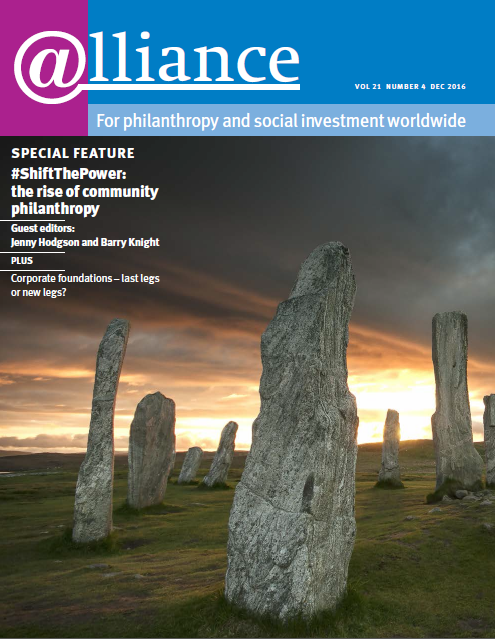‘The most radical way to advance meaningful change is to shift economic, social and cultural power to those who don’t have it.’ (Peter Buffett and Jennifer Buffett, Novo Foundation) The emergence of community philanthropy offers a new way of looking at philanthropic enterprise and international development.
The essence of community philanthropy is that development should be owned by local people not imposed from the outside, and that power should be shifted closer to the ground to give people control over their own destiny. Community philanthropy’s advocates, many of whom are featured in this issue of Alliance, argue that, in addition to being socially just, this approach to development holds the key to sustainability – something that has eluded many efforts of the development industry in recent years.
In a powerful call to action to coincide with the December 2016 Global Summit on Community Philanthropy in Johannesburg, guest editors Jenny Hodgson and Barry Knight argue that durable development requires the formation of local assets, the fostering of trust, and capacity building from the bottom up. As they put it, community philanthropy’s emphasis on ‘local resources and local accountability’ is a central pillar for ‘effective development shaped by new principles’. The eight pillars of community philanthropy are elaborated and also reflected on our front cover.
Yet community philanthropy is not without critics. A section on ‘difficult issues’ highlights some of the challenges. While Tobias Jung investigates whether community philanthropy can tackle inequity in private resource allocation, Monika Pisankaneva and Boris Strečanský ask hard questions about the exclusion of minority groups and Susan Wilkinson Maposa examines how the field can use data wisely to improve practice.
Many opportunities exist alongside these challenges. In a section on ‘Resourcing community philanthropy’, Danny Sriskandarajah notes that community philanthropy can resolve the problems caused by the ‘dominant development modalities’ that have contributed to the closing space for civil society. As he puts it: ‘Resourcing community philanthropy would enable civil society to flourish.’ In this view, community philanthropy is not just an effective tool for development impact. It is also an instrument of social and political transformation.
The promise of community philanthropy is high but so are the stakes. Our issue ends with perspectives from funders who are grasping – or beginning to grasp – these issues. The last word goes to the Mott Foundation – a pioneer of community philanthropy and philanthropy infrastructure. Its president, Ridgway White, comments: ‘Community philanthropy is the great equalizer of the charitable sector – everyone can have a seat at the table.’ Alliance will look with interest at who ends up with a seat at the table in the coming years, not least on the boards of community foundations.
Charles Keidan is editor at Alliance.






Comments (0)